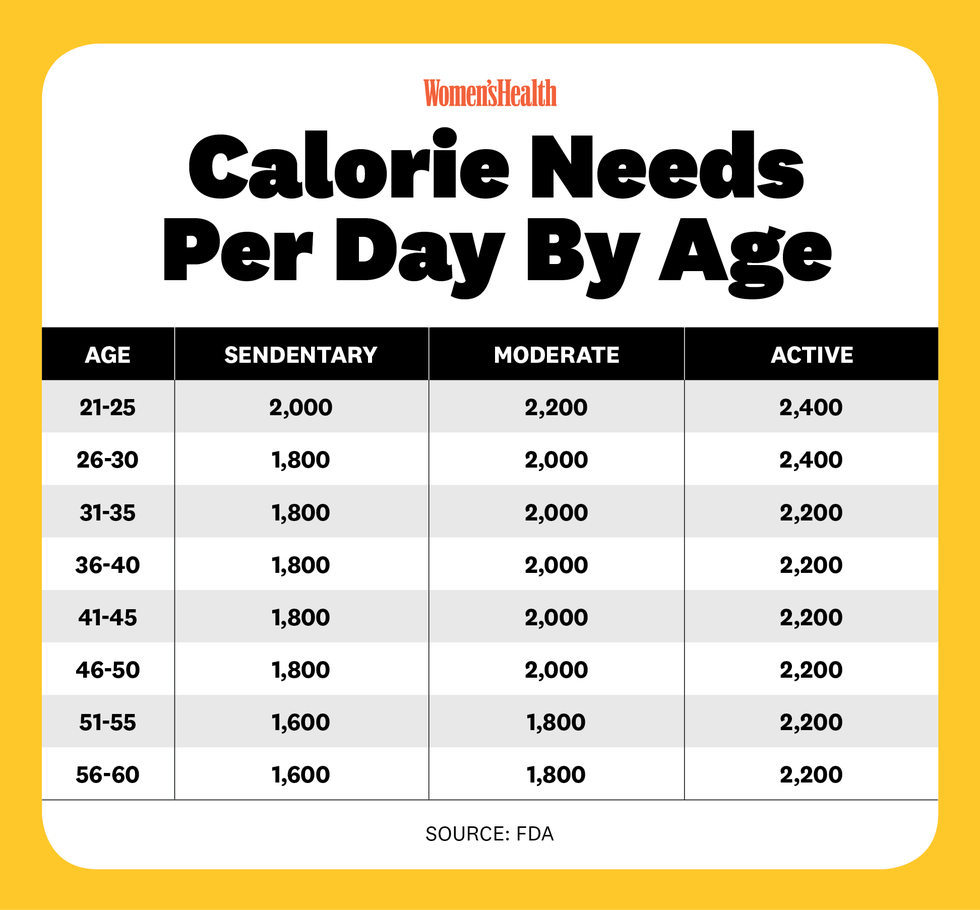What Is A Calorie Deficit?

If you’re trying to lose weight, it’s natural to want an efficient solution. During your search for the ideal weight loss method, you may have heard that being in a calorie deficit can help. But what is a calorie deficit, how do you calculate it, and can it really help you achieve your wellness goals?
“A calorie deficit is when you consume fewer calories than your body requires to stay at its current weight,” says nutritionist Keri Gans, RD, author of The Small Change Diet. Your body needs to take in a certain number of calories to maintain your weight, so if you consume less than your body needs, your body turns to the calories you stored to burn for energy. As a result, you’ll lose weight over time, she explains.
Although creating a calorie deficit sounds straightforward, the process isn’t one size fits all. It’s no secret that monitoring calories can be overwhelming, and it can also be tricky to measure exactly how many you need (and burn) per day. Ahead, experts break down everything you need to know about calorie deficits and how to achieve one in a healthy, sustainable way.
Meet the experts: Keri Gans, RD, is an NYC-based nutritionist and the author of The Small Change Diet. Sonya Angelone, RD, is a dietitian and former Academy of Nutrition and Dietetics spokesperson. Roxana Ehsani, RD, is a nutritionist who specializes in sports dietetics. Dana Ellis Hunnes, PhD, is a senior dietitian at UCLA Medical Center. Morgan Goodstadt, RDN, is a dietitian and the founder of Good Nutrition.
What is a calorie deficit?
First, the basics: A calorie is a measurement of energy, and the calories in your food supply your body with the fuel it needs to survive. Everyone’s caloric needs and deficits are different and depend on many factors, like genetics, hormones, metabolism, and how much you exercise, says dietitian Sonya Angelone, RD.
If you’re looking to lose weight, one of the first things you’ll hear is that a calorie deficit can help speed up the process. Maintaining a calorie deficit basically means that you’re consuming fewer calories than your body technically needs to maintain your weight, and as a result, your body is burning through calories quicker for energy. As a result, the number on the scale might go down. That said, you can work toward a calorie deficit by eating fewer calories and/or burning more calories through exercise and movement (more on that later).
How many calories do you need in a day?
Adult women most likely require between 1,600-2,400 calories per day, and adult males from 2,200-3,000, according to the 2020-2025 Dietary Guidelines for Americans. Additionally, the below table can help you find your range based on your age and how active you are:
How To Calculate A Calorie Deficit
Consider the options below to find your basal metabolic rate (BMR), which is the minimum number of calories your body needs to function properly every day, then, factor in how many calories you think you burn from activities during the day. (This won’t be a perfect science.) Then, anything below that should be a calorie deficit that will help you lose weight over time.
With an online calculator
Don’t feel like doing the math? There are plenty of online calculators that can help. The National Institute of Health’s Body Weight Planner is a good one to try, Angelone says. It looks at your current weight and fitness level, along with your weight-loss goals, and helps map out how many calories you need to take in to lose the weight over the period of time you specify. A nice perk: It also tells you how many calories to aim for once you reach your goal weight to help maintain it.
With your doctor or nutritionist
Generally speaking, it’s a good idea to consult a healthcare provider who can help you determine your unique needs. That said, keep in mind that every practitioner might have a different strategy—for instance, some may take body measurements (like weight and height) or do metabolic testing to determine how many calories you burn at rest. Others may focus on small changes that can naturally lead to weight loss.
With a formula
Your activity level, age, height, quality of sleep, and weight all affect the exact number of calories you need. That said, the most popular equation used is likely the Mifflin-St. Jeor equation, says dietitian Morgan Goodstadt, RDN, founder of Good Nutrition. This equation calculates your basal metabolic rate (BMR), which is the minimum number of calories your body burns at rest.
For women, the Mifflin-St. Jeor equation is: BMR = (10 x weight in kg) + (6.25 x height in cm) – (5 x age in years) – 161.
So, the BMR equation for, a 25-year-old woman who is 5’4″ and weighs 150 pounds would be this: BMR= (10 x 68) + (6.25 x163) – (5 x 25) -161 = 1,413 calories
The Harris Benedict equation is often used for comparison, and Goodstadt says some studies suggest that the Harris-Benedict Equation may be more accurate than Mifflin-St. Jeor. That equation is: BMR = 655.1 + (9.563 x weight in kg ) + (1.850 x height in cm) – ( 4.676 x age in years).
For the same 150-pound woman, the BMR using the Harris Benedict equation would be: BMR= 655.1 + (9.563 x 68) + (1.850 x 163) – ( 4.676 x 25) = 1,490 calories
The results are slightly different depending on which formula you use. And Angelone stresses, “This is still an estimate, since so many factors affect weight loss.”
How To Lose Weight During A Calorie Deficit
Losing weight is an individual journey, and it may take some trial and error to figure out a method that’s safe, healthy, and works for you. That said, here are some expert-approved tips for losing weight while maintaining a calorie deficit:
- Prioritize movement and exercise. If you’re burning more calories through exercise than you consume in a day, you will have a calorie deficit, says Dana Ellis Hunnes, PhD, a senior dietitian at UCLA Medical Center. This is why any extra movement, like daily exercise and walks, can help.
- Add more fiber to your diet. “Build your meals with high-fiber foods, such as fruits and veggies, so you are still satisfied even though your entree size may be smaller than you are used to,” Gans says. “Vegetables are highly nutrient-dense and also contain lots of fiber and water, which bulk up the volume of your meal without adding tons of calories,” Goodstadt adds.
- Eat plenty of protein. “Protein is an important macronutrient for weight management because it helps ensure we are able to build or maintain muscle mass during a caloric deficit,” Goodstadt says, adding that it will also keep you feeling satisfied after meals.
- Limit added and refined sugar. Sugar offers little nutritional value while also providing excess calories, Goodstadt says. Check packaged foods for grams of added sugar, and aim to be as close to zero as possible. An easy way to do this is to opt for the plain, unsweetened versions of things like yogurt and milk, and limit sugary beverages like soda and fruit juice.
- Slow down at meal times. Take time to eat away from screens or desks, eat slowly, chew your food, and actually taste it! “This gives the body time to digest properly and recognize fullness cues,” Goodstadt says. “Sometimes, when we eat too quickly, the brain/body does not register that we are full, which causes us to overeat.”
- Limit snacking after dinner. This is usually the best way to maintain a deficit, per Angelone. “Most people have met their calorie needs by then, so eating after dinner or before bed just adds extra calories,” she says. That said, if you get a late night craving, don’t restrict yourself—try a low-calorie food or healthy snack before bed.
Risks Of A Calorie Deficit
One of the most obvious risks of being in a calorie deficit is that it can be very restrictive. “Most people might not pick the correct total amount of calories to go off, then create too much of a restrictive calorie deficit for themselves to follow,” says dietitian Roxana Ehsani, RD.
Excessive caloric restriction may also backfire, contributing to strong hunger cravings, Goodstadt says. “Calories provide energy to our cells to function properly, and if we are over-restricting, our body will send hunger signals (usually for quick-burning calories in the form of sugar and simple carbohydrates).”
Consuming too few calories can lower your BMR, Goodstadt says. And when BMR decreases, she explains, as soon as you return to eating “normally,” you gain the weight back (and sometimes a little more). “Nutrition theory suggests that the body does this to prevent starvation if/when the body is exposed to future famine (aka your next crash diet),” she says.
Another risk of being in a calorie deficit is that any caloric restriction with an inadequate intake of protein and physical exercise may also lead to loss of muscle mass. “Typically, the goal of caloric restriction is to reduce fat mass and preserve muscle mass, but if done incorrectly, we create the opposite effect,” shares Goodstadt. “This is why it can be helpful to work with a professional or dietitian to help you figure out a holistic nutrition and lifestyle plan that works best for your body.”
Finally, excessive restriction may lead to bone and muscle loss, brain fog, constipation, dizziness, fatigue, headaches, hormone imbalances, and poor immune function, per Goodstadt. But the key word here is “excessive” calorie restriction. When done properly, a calorie deficit can be a healthy way to lose weight.
Frequently Asked Questions
What is a safe calorie deficit for weight loss?
“Healthy weight loss is considered one to two pounds per week,” Gans notes. It is thought that shaving approximately 500 calories from your daily intake should lead to one pound of weight loss per week. That said, you don’t necessarily have to drop 500 calories per day to lose weight. Any deficit will lead to weight loss, Angelone adds. “It may just take more or less time, depending on how great the deficit.”
Why aren’t you losing weight on a calorie deficit?
If you’re in a calorie deficit but aren’t losing weight, there may be something more serious going on. “There could be an underlying health condition that hasn’t been treated or detected yet that may make it more difficult for you to lose weight,” says Ehsani. For example, a thyroid or hormonal issue could hinder weight loss. Talk to your doctor if you suspect this may be the case.
Inadequate sleep could also be the culprit—it increases ghrelin production (your hunger hormone), decreases leptin production (the satiety hormone), and contributes to insulin resistance, says Goodstadt. But there’s also a chance you’re simply following a calorie deficit or a specific number of calories that isn’t working out for you—so always consult your doctor before panicking that nothing is working.
Korin Miller is a freelance writer specializing in general wellness, sexual health and relationships, and lifestyle trends, with work appearing in Men’s Health, Women’s Health, Self, Glamour, and more. She has a master’s degree from American University, lives by the beach, and hopes to own a teacup pig and taco truck one day.
Emily Shiffer is a freelance health and wellness writer living in Pennsylvania.
Ashley Martens is a wellness writer based in Chicago. With a lifelong passion for all things health and wellness, Ashley enjoys writing about topics to help people live happier and healthier lives. With a foundation in fitness, food, and nutrition, Ashley covers it all including sexual health and travel topics. Ashley is also a NASM-certified personal trainer and group fitness instructor.
Morgan Goodstadt is a registered dietitian, holds a master’s in mlinical nutrition, a certified integrative and functional nutritionist, and a health coach. She runs a nutrition private practice called Good Nutrition where she combines her expertise in nutrition with evidenced-based functional medicine and experience in human behavior to help her clients improve their health, relationship with food, and overall well-being.
link








:max_bytes(150000):strip_icc()/EWL-best-no-added-sugar-drinks-to-hydrate-8675270-3x2_preview-c0d05cf54f864461ac848b3bc4b1f12f.jpg)